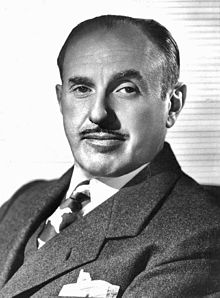
Back جاك وارنر Arabic جاك وارنر (كاتب) ARZ Jack Warner AST জ্যাক এল. ওয়ার্নার Bengali/Bangla Jack Warner Czech Jack Warner Danish Jack L. Warner German Τζακ Γουόρνερ Greek Jack Warner Spanish جک وارنر Persian
Jack L. Warner | |
|---|---|
 | |
| Born | Jacob Warner August 2, 1892 |
| Died | September 9, 1978 (aged 86) Los Angeles, California, U.S. |
| Resting place | Home of Peace Cemetery, East Los Angeles, California, U.S. |
| Other names | Jack Leonard Warner |
| Occupation | Film executive |
| Years active | 1918–1973 |
| Political party | Republican |
| Spouses | Irma Claire Salomon
(m. 1914; div. 1935)Ann Page (m. 1936) |
| Children | 3, including Jack M. Warner and stepdaughter Joy Page |
| Relatives | brothers Harry, Albert, and Sam Warner |
Jack Leonard Warner (born Jacob Warner;[1] August 2, 1892 – September 9, 1978) was a Canadian-American film executive, who was the president and driving force behind the Warner Bros. Studios in Burbank, California. Warner's career spanned over 55 years, surpassing that of any other of the seminal Hollywood studio moguls.[2]
As co-head of production at Warner Bros. Studios, Warner worked with his brother, Sam Warner, to procure the technology for the film industry's first talking picture, The Jazz Singer (1927).[3] After Sam's death, Jack clashed with his surviving older brothers, Harry and Albert Warner. He assumed exclusive control of the company in the 1950s when he secretly purchased his brothers's shares in the business after convincing them to participate in a joint sale of stocks.[4]
Although Warner was feared by many of his employees and inspired ridicule with his uneven attempts at humor, he earned respect for his shrewd instincts and tough-mindedness.[2] He recruited many of Warner Bros.' top stars[5] and promoted the hard-edged social dramas for which the studio became known.[6] Given to decisiveness, Warner once commented, "If I'm right fifty-one percent of the time, I'm ahead of the game."[2]
Throughout his career, Warner was viewed as a contradictory and enigmatic figure.[7] Although he was a staunch Republican, he encouraged film projects that promoted the policies of Democratic President Franklin D. Roosevelt.[6] He also opposed European fascism and criticized Nazi Germany well before America's involvement in World War II.[8] An opponent of communism, after the war Warner appeared as a friendly witness before the House Un-American Activities Committee, voluntarily naming screenwriters who had been fired at the time as suspected communists or sympathizers.[9] Despite his controversial public image, Warner remained a force in the motion picture industry until his retirement in the early 1970s.
- ^ Foster, Charles. Once Upon a Time in Paradise: Canadians in the Golden Age of Hollywood, Dundurn (2003) p. 990
- ^ a b c Thomas (1990), p. 4.
- ^ Thomas (1990), pp. 52–62.
- ^ Cite error: The named reference
thomas226was invoked but never defined (see the help page). - ^ Thomas (1990), pp. 45–49.
- ^ a b Buhle and Wagner (2002), p. 59.
- ^ Thomas (1990), pp. 4–7.
- ^ Buhle and Wagner (2002), p. 68.
- ^ Buhle and Wagner (2002), pp. 377–378.
© MMXXIII Rich X Search. We shall prevail. All rights reserved. Rich X Search